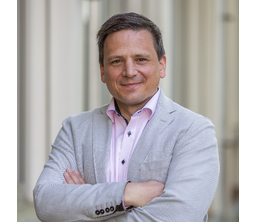Virtual Learning Factory IFP
The Virtual Learning Factory IFP aims to bundle the developments for the design of immersive virtual learning worlds at the Institute of Production (IFP). The vision is to provide learners with virtual learning environments that extend the possibilities of real learning environments by significant points. This vision is implemented in two ways:
- 360°-3D immersive video material
- interactive learning worlds by means of virtual reality (VR)
In order to fulfill the TH Köln's goal of practice-oriented teaching, company visits are made possible in the degree programs as a supplement to practice-oriented teaching content. Since only very few companies regularly want to receive larger groups for company visits and there are additional restrictions in the timetable and in the accessibility by public transport to consider, the offer of such opportunities is very limited and difficult to provide.
This is where the first part of the vision steps in. The experience of a real situation in the form of immersive 360°-3D video tours. This involves capturing images and video footage using a 360°-3D camera. The content can be experienced and analyzed by the students independently of time and place by means of VR glasses or on their personal computers. In addition, synchronous playback of the content on several VR glasses, i.e. joint viewing of the same scenes in the seminar room, is also possible. In a first pilot project, a plant tour at DEUTZ AG was virtualized.
This virtual plant tour is now available in the degree programs B.Eng. Production & Logistics and B.Sc. Logistics in the module Production Logistics.
 Deutz AG - VR Tour visitor entrance
(Image: TH Köln)
Deutz AG - VR Tour visitor entrance
(Image: TH Köln)
In another project, a VR tour of the campus site Deutz was created for advertising the logistics degree program and as freshman information. You can take the freely accessible VR tour here. The making-off video is also embedded there, which shows the technology and approach used.
The second part of the vision aims to enable students to interact immersively in virtual industrial environments. In the model factory of the Institute of Production (IFP), this is already possible in reality today. However, in contrast to the virtual world, there are clear limits to this. For example, it is not possible to move machines to a new layout. Also, the interaction of learners with machines and assemblies is limited due to safety requirements. Basically, real learning factories are always designed for certain learning scenarios, e.g. production types and products, which can only be changed in a very time-consuming way. These limitations can be broken down by virtual learning factories, which can be changed by pushing a button.
 Industry partner of the research project "Efficiency of learning processes"
(Image: TH Köln)
Industry partner of the research project "Efficiency of learning processes"
(Image: TH Köln)
The first components of the virtual learning factory were developed in a research project together with industry partners. This research project analyzed, among other things, how efficient the learning process in an assembly in VR is compared to other learning scenarios.
A video of the research project "Efficiency of learning processes" in which the individual learning scenarios and the approach were filmed can be found here.









